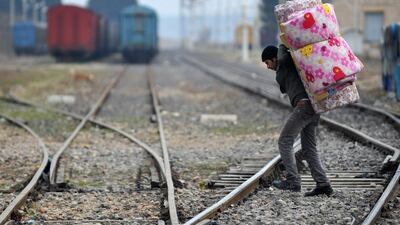GAZIANTEP, TURKEY // The massive influx of refugees from Syria has led to rising public anger in southern Turkey with allegations of rising living costs, the undermining of Turkish businesses, and pressure on jobs.
In Gaziantep, a city of 1.5 million people about 60 kilometres north of the border that has become home to an estimated 200,000 Syrians, many Turkish citizens said the arrival of the Syrians had changed their lives for the worse.
“They steal and beg,” Kadir Sengir, a shopkeeper on Inonu Caddesi, one of the main streets in Gaziantep, said of the Syrians. “I don’t allow my own little daughter to play on the street anymore.”
Sinan Dagli, a 26-year-old shop assistant in Gaziantep, said he had been thrown out of the apartment where he lived with his wife and two children because Syrians offered the owner a much higher rent. “We used to pay 300 lira (Dh520), but the Syrians said they would pay 750 lira,” Mr Dagli said. “The owner told us we could stay if we paid 700 as well, but we couldn’t. So we had to move out from one day to the next.”
Competition from wealthy Syrians is not the only problem for Turks. Locals in Gaziantep said poor Syrians were driving down wages because they were willing to work in the informal sector for about half the Turkish minimum wage of just under 900 Turkish lira a month.
For years, Gaziantep had strong links to Syria, with trade flowing freely. But since the conflict began in 2011, the number of businesses run by Syrians in the city have increased, according to residents.
“Everything is fine,” said Bakir Hamadiye, a Syrian who fled his home in Aleppo six months ago, and now runs a kebab restaurant in Gaziantep. “I have Syrian as well as Turkish customers.”
Mr Hamadiye, who employs half a dozen other refugees as waiters and helpers, said he had not felt any discrimination from Turks.
But up the road, Zeki Cop, the owner of a Turkish kebab restaurant, complained about unfair advantages enjoyed by Syrians. He said Turkish authorities tolerated Syrian shops even though they were illegal. “They don’t need permissions, they don’t pay tax, they don’t pay anything,” Mr Cop said.
Last month, a crowd of Turks attacked a Syrian motorist in Gaziantep who had injured a Turkish woman and her child in a traffic accident in Gaziantep, according to news reports.
Police saved the Syrian driver, but the crowd moved on to a neighbourhood where many Syrians live. “Turkey belongs to us,” the crowd chanted. Authorities in Gaziantep later banned a planned anti-Syrian protest march in the city.
Anti-Syrian protests also broke out in Kahramanmaras, north-west of Gaziantep. “We don’t want Syrians,” demonstrators shouted, according to news reports. Several people were hurt in scuffles between demonstrators and the police.
Turkey has taken in a total of around 1.4 million Syrians, according to government figures. Around 200,000 Syrians are housed in refugee camps, but most live in cities and towns along the long border and in cities, where authorities say there are about 70,000 Syrians, while media reports put the figure at 300,000.
There has been much international praise for Turkey’s readiness to give refuge to Syrians under what the government of Recep Tayyip Erdogan, the prime minister, calls its “open door policy”. But in cities like Gaziantep, many people say they have to bear the economic and social cost of that policy.
Mr Sengir, the shopkeeper on Inonu Caddesi, said he had voted for Mr Erdogan’s ruling Justice and Development Party (AKP) in the past, but would not do so anymore. “The AKP is finished for me,” he said, adding that he would not vote for Mr Erdogan in the upcoming presidential election on August 10, in which the prime minister is running.
In Kilis, a provincial capital south of Gaziantep and a few kilometres from the Syrian border, locals agreed with Mr Sengir. Osman Besir, a waiter in a restaurant in Kilis, said he felt as if Syrians had overrun his hometown.
“There are days when I see hardly any Turks here at all,” he said. The local state hospital gave preferential treatment for Syrian patients, some of them wounded fighters from the war in Syria, he added. “As a Turk, you have to wait in line,” he said. “Keeping the border open has been a mistake.”
Despite the frustration expressed by people such as Mr Besir, it is unlikely that the discontent will translate into losses for Mr Erdogan in the presidential election. Polls show the prime minister is the clear favourite to become Turkey’s first directly elected president with around 55 per cent of the vote.
foreign.desk@thenational.ae

